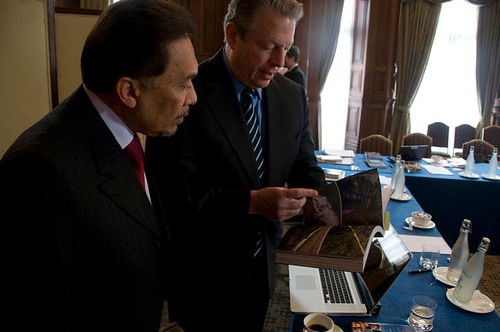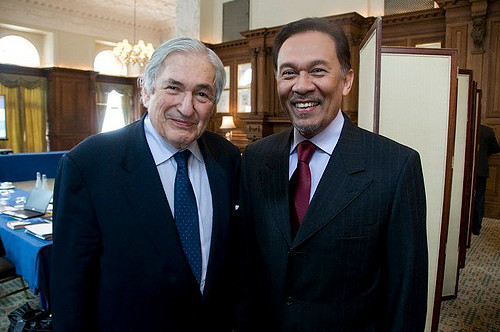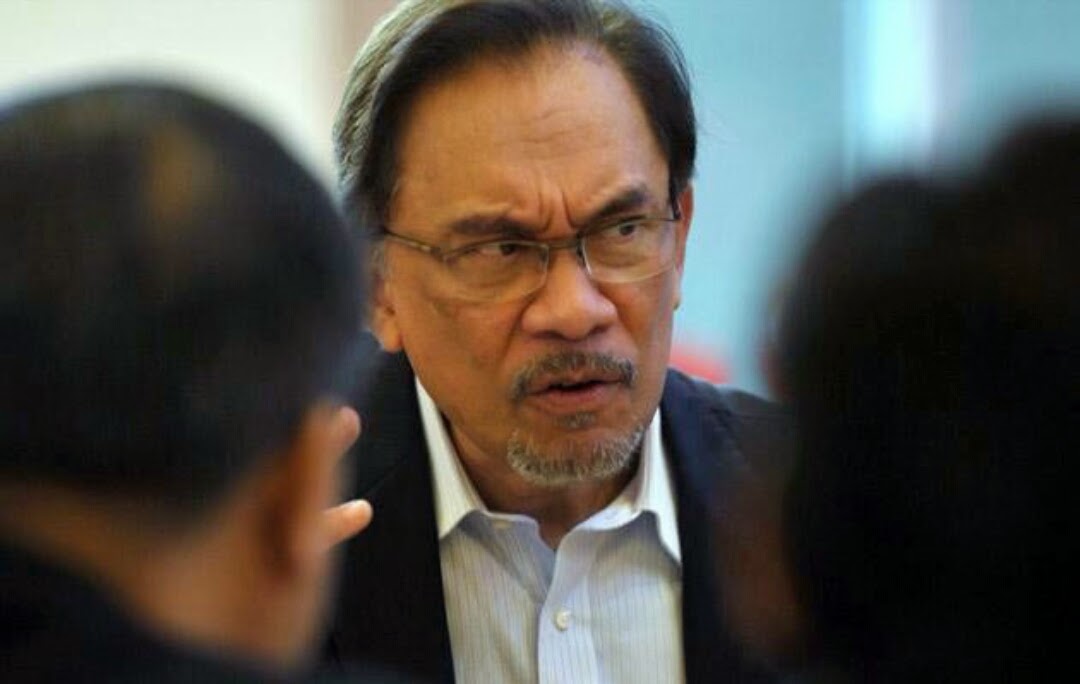
Anwar with Al Gore at the Generation Investment Management Group (GIM).
If you can still remember the justification given by Datuk Seri Anwar Ibrahim when asked why he decided to stay permanently in the U.S. after his release from prison in 2004, the de facto PKR leader replied he wanted a 'constructive engagement', or that he wanted to 'narrow the divide between the Muslim world and the West.'
Nothwithstanding that, when Anwar's former private secretary, Muhamad Rahimi Osman made a revelation to AIDC Production recently, it was proven that Anwar's reply above was nothing more than a propaganda.
'Constructive Engagement' is mere political semantics used to cover his interests.
"Previously, I, too was enthralled by what I perceived as Anwar's greatness. However, when I came to know who the western 'personalities' were, most of whom were Jews, I realised then that there was nothing great about Anwar.
"The Jews used Anwar because it was Anwar who sucked up to them," said Rahimi when interviewed.
In the first segment of the interview with Rahimi, he showed several documents in the form of letters, among which was a letter from Anwar to the President of the World Bank, Robert Zoellick.
"This is one example of the letters Anwar sent to Robert Zoellick, his foreign friend – the President of World Bank, " he said. (Refer to minute 1.20)
For that missive Anwar used the AccountAbility letterhead, an organisation based in London and the U.S. of which he was the Honorary President. The letter was sent on September 18, 2007.
A Jew, Zoellick is a member of the Council on Foreign Relations (CFR), who was appointed by U.S. President George W. Bush as President of World Bank to replace Paul Wolfowitz who had to relinquish his post following the explosive sex scandal involving his Muslim girlfriend, Shaha Ali Riza.
AccountAbility was the orgnanisation whose patron was Al Gore, who in turn appointed his proxy, Simon Zadek, an Advisory Board Member of Generation Investment Management (GIM) as Honorary President.
Al Gore also appointed Anwar as Advisory Board Member of GIM and subsequently gave the chair of Honorary President of AccountAbility.
Anwar's appointment as Advisory Board Member of GIM raised many questions.
Owing to Al Gore's Jewish background, the company in which Anwar is involved (GIM) openly made investments in Israel.
Al Gore and GIM invested USD$10 million in GreenRoad, which has a a research facility at Yehuda, Beit Dagan in Israel and offices in Redmond Shores, California and No. 1, Eversholt Street, London.
The Content of Anwar's Letter to Zoellick
Anwar's letter dated September 18 2007 aimed to flatter Robert Zoellick, who had just been appointed President of World Bank. It's other purpose was to 'introduce his greatness' to be re-used at World Bank.
This means that the purpose of the letter was personal in nature – so that the World Bank would cooperate with him or his organisation, AccountAbility.

: James Wolfensohn with Anwar Ibrahim at Generation Investment Management
This proves that Anwar had been identified as a tool of the Jews since the 1990s, or maybe even since the 1980s, going by the testimony given by his personal assistant, Aasil Kazi Ahmad.
"When I was working in Washington DC from 2005 to 2006 I was invited by the former President of World Bank, Paul Wolfowitz to meet with the senior staff of World Bank. The purpose of the meeting was for me to understand the approaches used in management and accountability in each department of the bank," said Anwar to Zoellick.
According to Aasil Kazi Ahmad, Anwar's special officer for the U.S, Anwar's relationship with Wolfowitz started since the 1980s, when Wolfowitz, Zionist stalwart was the U.S. Ambassador to Indonesia.
Executive Intelligence Review (EIR) journalist Mike Billington said Wolfowitz was Anwar's godfather, benefactor as well as the source of the de factor PKR leader's posts and positions abroad.
When Anwar was in Sungai Buloh Prison, he wrote an article, which was smuggled out and sent to TIME magazine. In the article which was published on October 15 2001, Anwar criticised Osama bin Ladin and Saddam Hussein. He labeled both as terrorists in an attempt to get into Wolfowitz's good books, who at that time was the U.S. Secretary of Defence.
Anwar's tactic proved successfull. As soon as he was released from prison in 2004 and he immediately flew to Munich, Germany for alleged treatment for back pains, Wolfowitz wasted no time in visiting him. He also offered Anwar a special mission.
Soon after that Anwar went to the U.S. and upon arrival wasted no time to call on Wolfowitz at The Pentagon, where he was immediately bestowed much personal benefits from the Zionist personality, including appointment as visiting lecturer at John Hopkins University, where, incidentally, Wolfowitz was dean at one time.
Anwar turned a blind eye to the views put forth by his friends in Malaysia about his relationship with the Zionist, who was better known as the architect of the war on the Islamic world. To Anwar Wolfowitz was not the enemy, as from him he got much personal benefits.

Anwar Ibrahim with Paul Wolfowitz at Munich
"Obviously I would be very happy if he (Wolfowitz) was appointed to the World Bank. He full heartedly committed himself in fighting for freedom, and he understood the issues of poverty, environment, life and health which are central in the agenda of the World Bank," Anwar told Bloomberg in Hong Kong on March 18 2005.
After Wolfowitz was appointed World Bank President, Anwar followed suit with an appointment as the bank's consultant, as well as chairman and President of Foundation for the Future.
Anwar's involvement in the scandal that plagued Wolfowitz attracted world attention.
"In his blog published in the website 'The Nation,' David Corn mentioned that last October 1, Anwar wrote to Wolfowitz's aide, Robin Cleveland asking him to help transfer Shaha Riza from the State Department to the Foundation for the Future.
Proof of Anwar's hand in the matter can be found in the letter documented in the World Bank investigation report, 'Ethics Committee Case No. 2 and President Papers.'
In July 2010, the Washington-based foundation called The Government Accountability Project (GAP) issued a detailed report on the involvement of Anwar Ibrahim, Paul Wolfowitz and Shaha Riza in the Foundation for the Future.
The report claimed that Anwar collaborated with his good friend, Paul Wolfowitz to decieve the U.S. Internal Revenue Service (IRS) in relation to the funds of Foundation for the Future.
As a result of the scandal, Wolfowitz had to withdraw from the World Bank. His resignation meant that Anwar, too, had to leave his position as consultant with the bank and the Foundation for the Future.
As soon as Wolfowitz lost his authority at the World Bank, Anwar shifted his sights and began to lobby another Zionist, Zoellick, who had just staken over as head honcho there.
"Once again I congratulate you on your new appointment at the World Bank and hope we can meet the soonest possible, perhaps in conjunction with my visit to Washington DC in autumn."
"Meanwhile I am always honoured to render whatever assistance to you and all the staff to help realise the bank's mission," he told Zoellick.
Anwar's letter to Zoellick:
September 18, 2007
Mr. Robert Zoellick
World Bank Group
1818 H St. NW
Washington DC 20433
Dear Bob,
I would like to offer my congratulations to you on your return to Washington DC. When I first heard rumours of your ascension to Presidency of the World Bank I was certain that the Board of Directors would make the right decision in supporting your nomination.
Having worked with you for so many years I must say that I am pleased that the Bank's leadership has fallen into the hands of someone with your vision and your calibre of experience dealing with issues of trade and development, and your commitment to the underlying principles of accountability and good governance.
Your stewardship over the Bank comes at a time when the work of the international community and of multilateral institutions in promoting peace and combating poverty has come under great scrutiny. As you are well aware, there are many around the world who, in an era of increased global prosperity, have experienced none of the ostensible benefits of globalisation.
On the contrary, they have seen their access to markets curtailed and they have seen multinational corporations foster cosy relationships with tyrants and dictators who in turn amass great personal wealth at the expense of their people's human rights and livelihoods.
Over time these facts, overshadowed by some policies of the West, be they American and British support for the war in Iraq or the IMF's perceived and real role in the devastating impact of the Asian Financial crisis, tend to be viewed monolithically and without discrimination as compelling evidence of the West's duplicitous intentions.
While these suspicions are justified on some accounts, I have never given up my underlying belief in the World Bank's pivotal role in shaping and advancing the agenda of poverty eradication. I implore my audiences, friends and colleagues throughout Asia and the Middle East to re-examine their positions in light of the mandate of the Bank, its positive contributions in terms of development efforts and poverty alleviation, and the sincere dedication of its staff throughout the many decades that they have been engaged with the developing world.
Much of the credibility deficit that the World Bank suffers is a result of its encounter with and failure to adequately address issues of corruption, both within its own ranks and in its dealings with governments in the developing world, which are often among the most corrupt regimes in the world.
Former President Jim Wolfensohn courageously confronted this issue during his tenure and since then the Bank has gradually adopted more strident approaches to combating, and indeed punishing those who act with impunity and disregard for rule of law. In the last two years the anti-corruption agenda came to the forefront of the debate on poverty eradication and how to improve the Bank's effectiveness in providing development assistance to poor countries around the world.
While many criticized the bluntness of your immediate predecessor's approach to the issue of corruption, we cannot deny that certain Bank policies, in particular the withholding of lending, sent a strong and emphatic signal against the pervasive corrupt behaviour in Kenya and Congo, and excesses in relevant ministries in India, Bangladesh and Uzbekistan.
I certainly empathize with those who equate such a move with collective punishment that disproportionately impacts those whose very survival is contingent on the flow of aid. But perpetuating a status quo in which billions of dollars are lost every year to corruption is in many ways equally criminal and intolerable.
In light of this I recommend that the underlying thrust of the anti-corruption drive should remain high on the list of priorities as you set the Bank's agenda for the coming years.
When I was based in Washington DC in 2005 and 2006 I was invited by former president Paul Wolfowitz to meet with senior World Bank staff to better understand the overall approach to issues of governance and accountability the different segments within the Bank.
Although in general there was a consensus among the staff that the efforts were fragmented and lacked coordination, I was quite impressed by specific examples of research, policies and operations the Bank already pursues to strengthen governance and promote bottom-up accountability. The Kecamatan Development Project is a particularly impressive program because of its scale and overall success.
I was also very supportive of the "Legal Modernization Initiative" designed to strengthen informal institutions that promote justice for the poor, engage in human rights issues, and address deficiencies of the judicial system by providing assistance for judicial training and investment in legal information to promote greater public awareness of the rule of law.
I would urge you to continue high-level support for ad-hoc and formal initiatives within the Bank to ensure that a vibrant debate on combating corruption continues among staff at all levels. I believe these interactions are the foundation for developing a comprehensive strategy on governance and accountability.
In March of last year I accepted the position of Honorary President at the international policy think-tank, AccountAbility. AccountAbility's approach is one of promoting accountability innovations in addressing many of today's governance gaps, rather than focusing on a traditional compliance agenda. Our view is that just pushing for more compliance is more likely to deliver the unwanted outcome of more efficient underdevelopment.
This unique perspective has enabled AccountAbility to take a leadership role in working on diverse policy and business accountability issues, ranging from its innovative AA1000 Sustainability Assurance standard that is now used by businesses around the world, to its bi-annual "State of Responsible Competitiveness" report that measures progress across over a hundred countries in embedding responsible business practices in national-level competitiveness strategies and practices.
AccountAbility's innovative lens has led to wide ranging institutional engagements, from assisting companies like GE and Coca Cola in developing collaborative approaches to human rights, through to a current engagement with the Chinese Government exploring where support for international voluntary standards like the Equator Principles could fit their longer term trade interests. I have enclosed a copy of the most recent edition of the State of Responsible Competitiveness for your interest.
AccountAbility has engaged with the WBG in several ways. We are the convenor of the MFA Forum, a multi-stakeholder initiative involving the WB/IFC Foreign Investment Advisory Services focused on assisting countries in transitions linked to the end of the Multi-Fibre Arrangement.
In addition, we recently completed a phase of policy research on the effectiveness and implications of the Banks' growing portfolio of support to Collaborative Standards Initiatives such as the Extractive Industry Transparency Initiative.
AccountAbility's focus on the nexus between economic development and competitiveness, business strategy and accountability, and building collaborative platforms has been a valuable resource to the many collaborative engagements that we have already been a part of and I do hope you remain open to ongoing collaboration with AccountAbility's work as it relates to the Bank's interests and agenda.
Should you wish to explore AccountAbility's work in more detail, I would suggest a meeting involving Simon Zadek, AccountAbility's Chief Executive.
Once again I congratulate you on your new position at the World Bank and look forward to meeting you soon, perhaps during my next visit to Washington DC in the fall. In the meantime I would be more than happy to provide any assistance to you and your staff in fulfilling the mission of the Bank.
Warm personal regards,
Anwar Ibrahim
Cc: Simon Zadek







.JPG)
















































































.jpg)





























Tiada ulasan:
Catat Ulasan